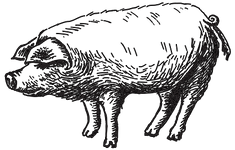
Farm animals
Sanctuaries in Alachua County provide refuge to
in need

By Ashleigh Lucas • WUFT News • Jan. 28, 2024
Critter Creek Farm Sanctuary is the largest rescue space for bovines in the U.S., according to its
founder and president, Erin Amerman, a Gainesville native who grew up loving animals.
The sanctuary houses more than 180 bovines at two locations: Critter Creek off County Road 231 in Gainesville and Critter Hills off County Road 239 in Alachua City. The majority of them were spared from the meat and dairy industries, but others came from abusive situations.
“Every animal is in need, and every animal wants to live,” Amerman said. “We try to focus on
the animals who are in the greatest need.”
With degrees from the University of West Florida in Pensacola and Des Moines University in Iowa, Amerman, 45, has written anatomy and physiology textbooks for 20 years.
However, she always knew she wanted to work with animals. She founded the sanctuaries in
2016 with hopes of expanding the public’s compassion for farm animals — that they might be
more than just something to eat.
Watch below as Amerman, a vegan and self-described cow-mom, tells her story.
Mookets
Farmers

Critter Creek holds regular “Farmers Mookets” on the first Sunday of every month to allow the
public to connect with some of the animals at the sanctuaries. Drawing between 700 to 1,500
people per event, the Mookets also feature food vendors who introduce people to different meat
and dairy substitutes as well as various artists who get to showcase their work.
“They’re only getting bigger,” Amerman said of the Mookets.
As a nonprofit organization, a majority of the funding to provide refuge to the animals comes from community donations.

Della and Emma Hursey hold grass through the fence to feed George Harrison Valentino, a cow meant to originally be a veal calf, at the Critter Creek Farm Sanctuary. (Ashleigh Lucas/ WUFT News)
 |  |  |  |
|---|---|---|---|
 |  |  |  |
 |  |
The sanctuaries also rescue other farm animals including pigs, horses, donkeys, turkeys and
the occasional water buffalo. Just like with male cows, Amerman said, male water buffalo don't
produce milk. The dairy industry treats the male buffaloes as “waste products,” she said.
The sanctuary’s first water buffalo, Seymour, was brought to Critter Hills in 2019. It now has
five water buffaloes under its care, Amerman said, with the fifth having arrived on Dec. 14, 2023.
Seymour is among those animals at the sanctuary who came from abusive situations.
Critter Creek's First Water Buffalo
Meet
Seymour
Sunrise
Cows

The story of the Sunrise cows started in Sunrise, Florida, where roughly 40 cows were rescued in 2021 from a cruelty case.
“The animals had been absolutely left to starve,” Amerman said.
After seeing photos of the cows in dire straits, she said she couldn't leave any “moo-person”
behind. The 40-cow rescue soon turned into a 50-cow group, as 10 were — she found out later — pregnant.
The sanctuary has more than 400 total acres, with half dedicated to wildlife preservation and the
other half set aside for the animals, Amerman said. Each cow alone needs roughly one acre of
land, making it difficult to take in more than just the “critters” in immediate danger, she said.
“They’re learning to trust us," Amerman said. "Some of them even like us a little bit, but it’s OK
if they don't ever. That's not the requirement here. This isn't a petting zoo.”
The Sunrise cows before coming to the sanctuary in 2021.
The Sunrise cows one year later in 2022.
The Sunrise cows greet Erin Amerman at one of her sanctuaries in November 2023. (Video by Ashleigh Lucas/WUFT News)
23
Not-So-Little Pigs

A lot of the 23 pigs at Critter Creek came from across the country and were raised to be killed for consumption, Amerman said. When they were first rescued, all of the pigs immediately suffered
sunburn, she said.
"They had never seen the sun before because they had been in a factory farm,” she said.
Brooke Pavek, a volunteer with the sanctuary, said most of the pigs at Critter Creek are very
docile and escaped some pretty unfortunate outcomes.

Click the icon at the bottom of each video to listen to the audio.
